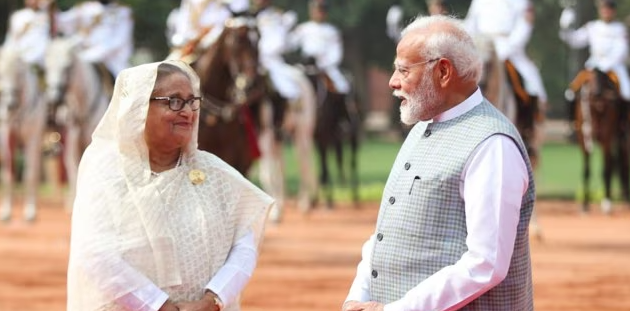Cementing Ties (GS Paper 2, IR)

Introduction
- Prime Ministers Sheikh Hasina of Bangladesh and Narendra Modi of India have been instrumental in strengthening the bilateral relations between Delhi and Dhaka over the last decade.
- Their persistent efforts have turned India and Bangladesh into valuable partners.
- It is fitting that Delhi hosted Sheikh Hasina for the first state visit by a foreign leader during PM Modi’s third term, marking a significant milestone in their relationship.
More about the Visit
- Frequent Engagement: PM Hasina's visit to Delhi came just two weeks after her previous visit for PM Modi's swearing-in, highlighting the intensity of the engagement between the two leaders. They have met 10 times over the past year, reflecting their commitment to advancing bilateral ties.
- Golden Chapter: The productive outcomes of their commitment have been hailed as a “golden chapter” in the history of bilateral relations. The vision for a shared future promises to transform the extraordinary relationship of the last decade into a transformational partnership.
Matters Discussed During PM Hasina’s Visit
- Connectivity: The two countries emphasized the unfinished agenda of connectivity, which includes easing visa procedures, facilitating freer movement of goods, enhancing cross-border energy and electricity flows, and building digital bridges.
- Trade Relations: Bangladesh has emerged as one of India’s most important trade partners. The two nations propose to commence negotiations on a comprehensive economic partnership agreement (CEPA). This agreement is crucial for free trade across India’s longest frontier and the second-largest economy in the Subcontinent, especially amidst the breakdown of the global trading order.
- Economic Integration: As one of the world’s fastest-growing economies, Bangladesh is a natural partner for India in rearranging the South Asian regional economic order. The transformation of the India-Bangladesh economic relationship lays a solid foundation for the sub-regional integration of the eastern Subcontinent, the Bay of Bengal littoral, and the eastern Indian Ocean.
Enhancing Bilateral Defence Partnership
- Modernization: Hasina and Modi have outlined ambitions to modernize the bilateral defence relationship, which has lagged behind commerce and connectivity. This would involve wide-ranging collaboration between the armed forces of the two countries, defence industrial partnerships, and Delhi’s support for the modernization of Dhaka’s armed forces.
- Regional Stability: A substantive bilateral defence partnership will contribute to maintaining stability in the wider Indo-Pacific region through collaboration on disaster mitigation and building resilient infrastructure.
- Global South Interests: Expanded regional and international collaboration between Delhi and Dhaka will help promote the collective interests of the Global South.
Challenges in the Relationship
- Border Disputes: Unresolved border demarcations, particularly in Assam and Tripura, lead to tensions and occasional clashes between border guards.
- Water Sharing: Sharing water resources from the 54 common rivers is a sensitive issue. Treaties exist for only a few rivers, and managing water flow during dry seasons can cause friction.
- Illegal Migration: Bangladesh's population density and economic disparity push some citizens to migrate to India, straining resources in bordering Indian states. The issue of Rohingya refugees further complicates matters.
- Trade Barriers: Non-tariff barriers and complex regulations hinder smoother economic ties.
- Security Concerns: Cross-border smuggling of drugs and human trafficking are ongoing issues requiring cooperation.
- External Influences: China's growing economic influence in Bangladesh is perceived as a strategic challenge for India.
Conclusion
- The last decade in Indo-Bangla bilateral relations has seen two strong leaders overcome the bitter legacies of Partition in the eastern subcontinent.
- While some issues like river water management remain unresolved, the shared vision for the future articulated by Hasina and Modi raises hopes for realizing the full potential of the bilateral relationship.
- Their commitment to connectivity, trade, and defence cooperation promises a brighter, more integrated future for both nations.


